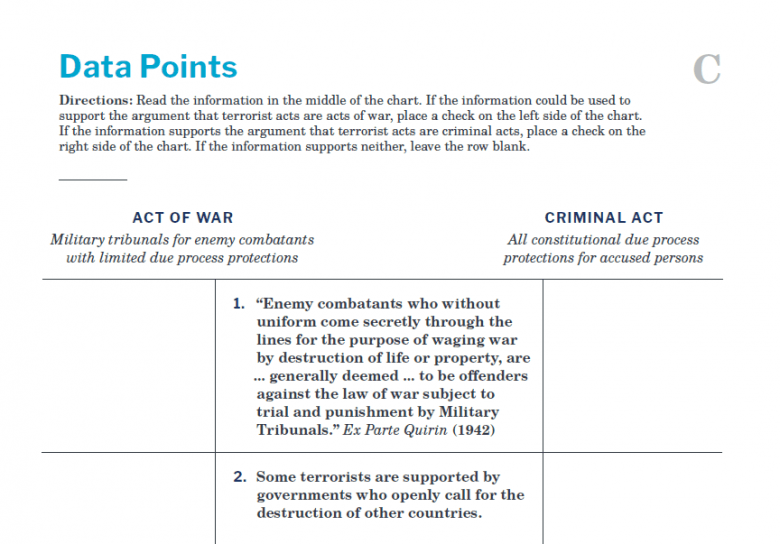Handout C: Data Points (War on Terror)
Data Points
Directions: Read the information in the middle of the chart. If the information could be used to support the argument that terrorist acts are acts of war, place a check on the left side of the chart. If the information supports the argument that terrorist acts are criminal acts, place a check on the right side of the chart. If the information supports neither, leave the row blank.
(Fillable Chart in PDF)
ACT OF WAR: Military tribunals for enemy combatants with limited due process protections
CRIMINAL ACT: All constitutional due process protections for accused persons
- “Enemy combatants who without uniform come secretly through the lines for the purpose of waging war by destruction of life or property, are … generally deemed … to be offenders against the law of war subject to trial and punishment by Military Tribunals.” Ex Parte Quirin (1942)
- Some terrorists are supported by governments who openly call for the destruction of other countries.
- Congress never declared war against Afghanistan; it did, however, authorize the President to use military force against “those nations, organizations, or persons he determines planned, authorized, committed, or aided the terrorist attacks that occurred on September 11, 2001, or harbored such organizations or persons.”
- When the hijackers boarded their four flights on September 11, 2001, they were not wearing Al-Qaeda uniforms or any military uniform; they were dressed like ordinary civilians.
- Evidence presented at criminal trials will be made public in the US and international press.
- The North Atlantic Treaty Organization (NATO) invoked its charter for the first time in its history in response to the attacks: The September eleventh attacks were an attack on all the NATO allies.
- Some, but not all, detainees at Guantanamo Bay are accused of (or admit to) planning the September 11 attacks. Others as suspected of planning or aiding in other terrorist acts.
- Constitutional protections against self- incrimination should apply even against people who might have information about future terrorist attacks.
